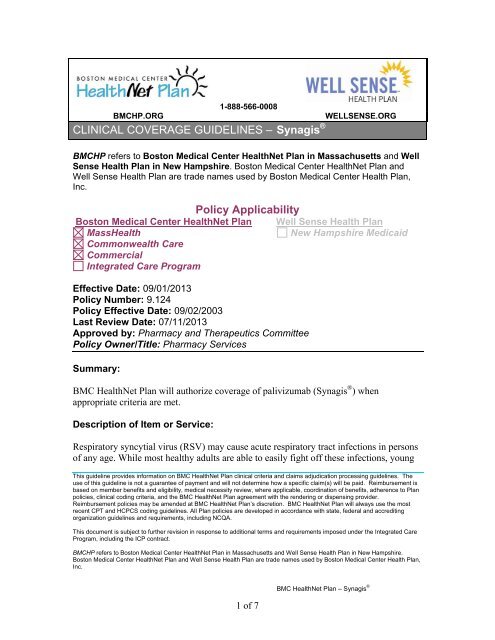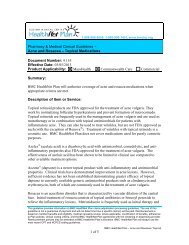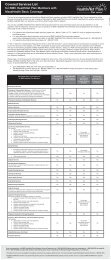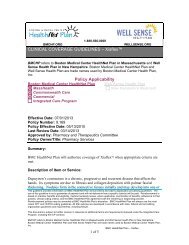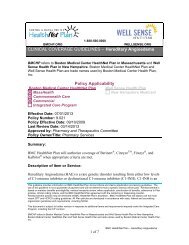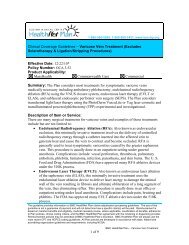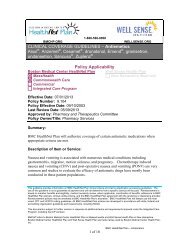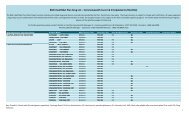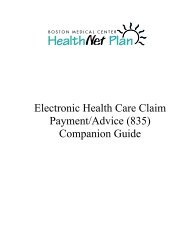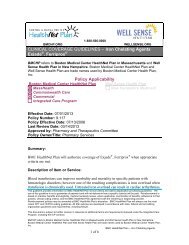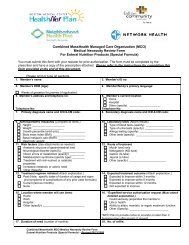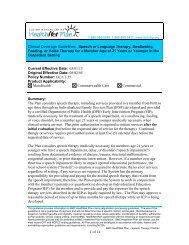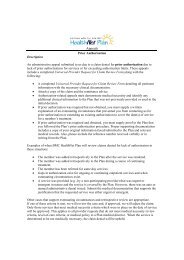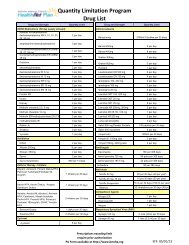Synagis - BMC HealthNet Plan
Synagis - BMC HealthNet Plan
Synagis - BMC HealthNet Plan
Create successful ePaper yourself
Turn your PDF publications into a flip-book with our unique Google optimized e-Paper software.
1-888-566-0008<strong>BMC</strong>HP.ORGWELLSENSE.ORGCLINICAL COVERAGE GUIDELINES – <strong>Synagis</strong> ®<strong>BMC</strong>HP refers to Boston Medical Center <strong>HealthNet</strong> <strong>Plan</strong> in Massachusetts and WellSense Health <strong>Plan</strong> in New Hampshire. Boston Medical Center <strong>HealthNet</strong> <strong>Plan</strong> andWell Sense Health <strong>Plan</strong> are trade names used by Boston Medical Center Health <strong>Plan</strong>,Inc.Policy ApplicabilityBoston Medical Center <strong>HealthNet</strong> <strong>Plan</strong> Well Sense Health <strong>Plan</strong>MassHealthNew Hampshire MedicaidCommonwealth CareCommercialIntegrated Care ProgramEffective Date: 09/01/2013Policy Number: 9.124Policy Effective Date: 09/02/2003Last Review Date: 07/11/2013Approved by: Pharmacy and Therapeutics CommitteePolicy Owner/Title: Pharmacy ServicesSummary:<strong>BMC</strong> <strong>HealthNet</strong> <strong>Plan</strong> will authorize coverage of palivizumab (<strong>Synagis</strong> ® ) whenappropriate criteria are met.Description of Item or Service:Respiratory syncytial virus (RSV) may cause acute respiratory tract infections in personsof any age. While most healthy adults are able to easily fight off these infections, youngThis guideline provides information on <strong>BMC</strong> <strong>HealthNet</strong> <strong>Plan</strong> clinical criteria and claims adjudication processing guidelines. Theuse of this guideline is not a guarantee of payment and will not determine how a specific claim(s) will be paid. Reimbursement isbased on member benefits and eligibility, medical necessity review, where applicable, coordination of benefits, adherence to <strong>Plan</strong>policies, clinical coding criteria, and the <strong>BMC</strong> <strong>HealthNet</strong> <strong>Plan</strong> agreement with the rendering or dispensing provider.Reimbursement policies may be amended at <strong>BMC</strong> <strong>HealthNet</strong> <strong>Plan</strong>’s discretion. <strong>BMC</strong> <strong>HealthNet</strong> <strong>Plan</strong> will always use the mostrecent CPT and HCPCS coding guidelines. All <strong>Plan</strong> policies are developed in accordance with state, federal and accreditingorganization guidelines and requirements, including NCQA.This document is subject to further revision in response to additional terms and requirements imposed under the Integrated CareProgram, including the ICP contract.<strong>BMC</strong>HP refers to Boston Medical Center <strong>HealthNet</strong> <strong>Plan</strong> in Massachusetts and Well Sense Health <strong>Plan</strong> in New Hampshire.Boston Medical Center <strong>HealthNet</strong> <strong>Plan</strong> and Well Sense Health <strong>Plan</strong> are trade names used by Boston Medical Center Health <strong>Plan</strong>,Inc.1 of 7<strong>BMC</strong> <strong>HealthNet</strong> <strong>Plan</strong> – <strong>Synagis</strong> ®
children and infants are more susceptible to bronchiolitis and pneumonia caused by thevirus. Infants with congenital heart disease, pulmonary hypertension, underlyingpulmonary disease, premature birth, or those who are immunocomprimised are atincreased risk of developing complications associated with RSV and experiencing relatedmorbidity and mortality. While RSV may be present in the environment to varyingextents throughout the year, epidemics are typically seen during the winter and earlyspring months. At present, the American Academy of Pediatrics (AAP) defines the RSVseason as beginning in November and extending through the month of April.In 1998, the U.S. Food and Drug Administration approved palivizumab (<strong>Synagis</strong>), amonoclonal antibody for the prophylaxis of RSV infection in those most at risk ofdeveloping complications associated with the virus. Given the high cost of <strong>Synagis</strong> ®prophylaxis and that a majority of the population is capable of withstanding the effects ofthe virus with routine medical care, the AAP has developed guidelines for RSVprophylaxis therapy with <strong>Synagis</strong> ® . The clinical guideline statement below reflects themost recent AAP recommendations (updated June 2012).Clinical Guideline Statement:<strong>BMC</strong> <strong>HealthNet</strong> <strong>Plan</strong> may authorize coverage of <strong>Synagis</strong> ® for members meeting thefollowing criteria:Prior Authorization – <strong>Synagis</strong> ®A prior authorization request will be required for all prescriptions for <strong>Synagis</strong> ® . Theserequests will be approved when the following criteria are met:Prescriber must provide documentation of one of the following:1. Infants ≤28 weeks gestation who are ≤12 months at onset of RSV season (Up to fivemonthly doses between November 1st and March 31st will be approved)OR2. Infants 29-32 weeks (31 weeks, 6 days or less) gestation who are ≤6 months at onsetof RSV season (Up to 5 monthly doses between November 1st and March 31st will beapproved)ORThis guideline provides information on <strong>BMC</strong> <strong>HealthNet</strong> <strong>Plan</strong> clinical criteria and claims adjudication processing guidelines. Theuse of this guideline is not a guarantee of payment and will not determine how a specific claim(s) will be paid. Reimbursement isbased on member benefits and eligibility, medical necessity review, where applicable, coordination of benefits, adherence to <strong>Plan</strong>policies, clinical coding criteria, and the <strong>BMC</strong> <strong>HealthNet</strong> <strong>Plan</strong> agreement with the rendering or dispensing provider.Reimbursement policies may be amended at <strong>BMC</strong> <strong>HealthNet</strong> <strong>Plan</strong>’s discretion. <strong>BMC</strong> <strong>HealthNet</strong> <strong>Plan</strong> will always use the mostrecent CPT and HCPCS coding guidelines. All <strong>Plan</strong> policies are developed in accordance with state, federal and accreditingorganization guidelines and requirements, including NCQA.This document is subject to further revision in response to additional terms and requirements imposed under the Integrated CareProgram, including the ICP contract.<strong>BMC</strong>HP refers to Boston Medical Center <strong>HealthNet</strong> <strong>Plan</strong> in Massachusetts and Well Sense Health <strong>Plan</strong> in New Hampshire.Boston Medical Center <strong>HealthNet</strong> <strong>Plan</strong> and Well Sense Health <strong>Plan</strong> are trade names used by Boston Medical Center Health <strong>Plan</strong>,Inc.2 of 7<strong>BMC</strong> <strong>HealthNet</strong> <strong>Plan</strong> – <strong>Synagis</strong> ®
3. Infants (32 weeks, 0 days through 34 weeks, 6 days) who are ≤ 3 months of age at theonset of RSV season with either of the following risk factorsa. The infant attends daycareb. The infant has a sibling younger than 5 years of age living in the samehome; multiple births younger than 1 year of age do not qualify as this riskfactor. (Up to 3 monthly doses between November 1st and March 31st willbe approved. Prophylaxis is not indicated beyond 3 months of age)OR4. Infants ≤ 12 months of age with congenital abnormalities of the airway orneuromuscular disease that compromises handling of respiratory secretions. (Up to 5monthly doses between November 1st and March 31st will be approved.)OR5. Children ≤ 2 years of age at onset of RSV season with at least one or more of thefollowing risk factors:a. Significantly compromised immune function caused by but not limited toHIV, AIDS or cancer chemotherapyb. Child has received medical treatment (e.g.: supplemental oxygen,bronchodilators, diuretics, or corticosteroid therapy) for Chronic LungDisease within 6 months of onset of the RSV season.c. Child has hemodynamically significant congenital heart disease pre orpost repair as evidenced by:– Currently receiving medication for congestive heart failure– Documented moderate to severe pulmonary hypertension– Cyanotic or acyanotic heart disease(Up to 5 monthly doses between November 1st and March 31st will beapproved)Early Onset of RSV SeasonRequests to initiate <strong>Synagis</strong> ® prophylaxis prior to November 1 st will requiredocumentation confirming an RSV outbreak in the geographic region where the memberresides.If RSV prophylaxis is initiated in October due to early onset of the RSV season in aparticular geographic area, 5 monthly doses will be covered between October 1 st and thelast day of February (in cases where the member qualifies for 5 monthly doses).This guideline provides information on <strong>BMC</strong> <strong>HealthNet</strong> <strong>Plan</strong> clinical criteria and claims adjudication processing guidelines. Theuse of this guideline is not a guarantee of payment and will not determine how a specific claim(s) will be paid. Reimbursement isbased on member benefits and eligibility, medical necessity review, where applicable, coordination of benefits, adherence to <strong>Plan</strong>policies, clinical coding criteria, and the <strong>BMC</strong> <strong>HealthNet</strong> <strong>Plan</strong> agreement with the rendering or dispensing provider.Reimbursement policies may be amended at <strong>BMC</strong> <strong>HealthNet</strong> <strong>Plan</strong>’s discretion. <strong>BMC</strong> <strong>HealthNet</strong> <strong>Plan</strong> will always use the mostrecent CPT and HCPCS coding guidelines. All <strong>Plan</strong> policies are developed in accordance with state, federal and accreditingorganization guidelines and requirements, including NCQA.This document is subject to further revision in response to additional terms and requirements imposed under the Integrated CareProgram, including the ICP contract.<strong>BMC</strong>HP refers to Boston Medical Center <strong>HealthNet</strong> <strong>Plan</strong> in Massachusetts and Well Sense Health <strong>Plan</strong> in New Hampshire.Boston Medical Center <strong>HealthNet</strong> <strong>Plan</strong> and Well Sense Health <strong>Plan</strong> are trade names used by Boston Medical Center Health <strong>Plan</strong>,Inc.3 of 7<strong>BMC</strong> <strong>HealthNet</strong> <strong>Plan</strong> – <strong>Synagis</strong> ®
Table 1: Maximum Number of Palivizumab Doses for RSV Prophylaxis of Preterm Infants withoutLung disease, on the Basis of Birth Date, Gestational Age, and Presence of Risk Factors(Shown for Geographic Areas Beginning Prophylaxis on November 1)Maximum No. of Doses for Season Beginning November 129 Weeks, 0 DaysThrough 31 Weeks, 6Days of Gestation and
1. When the above criteria are not met.2. Requests to initiate <strong>Synagis</strong> ® prophylaxis prior to November 1 st withoutdocumentation confirming an RSV outbreak in a particular geographic region.3. For prophylaxis in patients with cystic fibrosis not meeting any other criteria.Clinical Background Information and References:1. <strong>Synagis</strong> ® [package insert]. Gaithersburg (MD): MedImmune, LLC; Apr 2013.2. Respiratory Syncytial virus. American Academy of Pediatrics. Red Book: 2012Report of the Committee on Infectious Diseases. Pickering LK, ed. 29th ed. ElkGrove Village, IL: American Academy of Pediatrics; 20123. American Academy of Pediatrics. Modified recommendations for use ofpalivizumab for prevention of respiratory syncytial virus infections. Pediatrics.2009. Dec;124(6): 1964-701.4. Feltes TF; Cabalka AK; Meissner HC; Piazza FM; Carlin DA et al. Palivizumabprophylaxis reduces hospitalization due to respiratory syncytial virus in youngchildren with hemodynamically significant congenital heart disease. J Pediatr2003 Oct; 143(4):532-40.5. Tulloh R; Marsh M; Blackburn M; Casey F; Lenney W et al. Recommendationsfor the use of palivizumab as prophylaxis against respiratory syncytial virus ininfants with congenital cardiac disease. Cardiol Young. 2003 Oct;13(5):420-3.6. Palivizumab is the only RSV immunoprophylactic agent approved for infants withcongenital heart disease. Adapted from: Revised indications for the use ofpalivizumab and respiratory syncytial virus immune globulin intravenous for theprevention of respiratory syncytial virus infections. Pediatrics 2003; 112:1442.7. Drugs at FDA. Available at:http://www.accessdata.fda.gov/scripts/cder/drugsatfda/index.cfm. Accessed July26, 2007.Policy History:Effective Date: 09/02/20035/12/2005 – P&T Annual Review1/11/2007 – P&T Annual Review, specific details of the American Academy ofPediatrics RSV Prophylaxis Criteria added.07/10/2008 – P&T Annual Review, no changes requiredThis guideline provides information on <strong>BMC</strong> <strong>HealthNet</strong> <strong>Plan</strong> clinical criteria and claims adjudication processing guidelines. Theuse of this guideline is not a guarantee of payment and will not determine how a specific claim(s) will be paid. Reimbursement isbased on member benefits and eligibility, medical necessity review, where applicable, coordination of benefits, adherence to <strong>Plan</strong>policies, clinical coding criteria, and the <strong>BMC</strong> <strong>HealthNet</strong> <strong>Plan</strong> agreement with the rendering or dispensing provider.Reimbursement policies may be amended at <strong>BMC</strong> <strong>HealthNet</strong> <strong>Plan</strong>’s discretion. <strong>BMC</strong> <strong>HealthNet</strong> <strong>Plan</strong> will always use the mostrecent CPT and HCPCS coding guidelines. All <strong>Plan</strong> policies are developed in accordance with state, federal and accreditingorganization guidelines and requirements, including NCQA.This document is subject to further revision in response to additional terms and requirements imposed under the Integrated CareProgram, including the ICP contract.<strong>BMC</strong>HP refers to Boston Medical Center <strong>HealthNet</strong> <strong>Plan</strong> in Massachusetts and Well Sense Health <strong>Plan</strong> in New Hampshire.Boston Medical Center <strong>HealthNet</strong> <strong>Plan</strong> and Well Sense Health <strong>Plan</strong> are trade names used by Boston Medical Center Health <strong>Plan</strong>,Inc.5 of 7<strong>BMC</strong> <strong>HealthNet</strong> <strong>Plan</strong> – <strong>Synagis</strong> ®
07/09/2009 – P&T Annual Review, change in criteria for infants born at 32-35 weeksgestational age, criteria added for early initiation of RSV prophylaxis(5 monthly dose limit)07/08/2010 – P&T Annual Review, no changes required07/14/2011 – P&T Annual Review, policy applied to Commercial07/12/2012 – P&T Annual Review, modified risk factor for infants born at 32-35 weeksgestational age, changed chronic lung disease of prematurity to CLD, added coverage forinfants with neuromuscular disease or congenital abnormality of the airways07/11/2013 – P&T Annual Review, no changes requiredNext Review Date: 07/10/2014Approval DatesRegulatory Approval: N/AInternal Approval:Initial approval by Pharmacy & Therapeutics Committee – September 2, 2003Authorizing entityP&T CommitteeIMPORTANT NOTE:‣ Not all services are covered for all products or employer groups. This medical policyexpresses the <strong>Plan</strong>'s determination of whether certain services or supplies are medicallynecessary, experimental or investigational or cosmetic. The <strong>Plan</strong> has reached theseconclusions based upon the regulatory status of the technology and a review of clinicalstudies published in peer-reviewed medical literature. Even though this policy mayindicate that a particular service or supply is considered covered or not covered, thisconclusion is not based upon the terms of a member’s particular benefit plan. Eachbenefit plan contains its own specific provisions for coverage and exclusions. Not allservices that are determined to be medically necessary will necessarily be coveredservices under the terms of a member’s benefit plan. Members and their providers need toconsult the applicable benefit plan document (e.g., Evidence of Coverage) to determine ifthere are any exclusions or other benefit limitations applicable to this service or supply. Ifthere is a discrepancy between this medical policy and the benefit plan document, theprovisions of the benefit plan document will govern. In addition, this policy and thebenefit plan document are subject to applicable state and federal laws that may mandatecoverage for certain services and supplies.This guideline provides information on <strong>BMC</strong> <strong>HealthNet</strong> <strong>Plan</strong> clinical criteria and claims adjudication processing guidelines. Theuse of this guideline is not a guarantee of payment and will not determine how a specific claim(s) will be paid. Reimbursement isbased on member benefits and eligibility, medical necessity review, where applicable, coordination of benefits, adherence to <strong>Plan</strong>policies, clinical coding criteria, and the <strong>BMC</strong> <strong>HealthNet</strong> <strong>Plan</strong> agreement with the rendering or dispensing provider.Reimbursement policies may be amended at <strong>BMC</strong> <strong>HealthNet</strong> <strong>Plan</strong>’s discretion. <strong>BMC</strong> <strong>HealthNet</strong> <strong>Plan</strong> will always use the mostrecent CPT and HCPCS coding guidelines. All <strong>Plan</strong> policies are developed in accordance with state, federal and accreditingorganization guidelines and requirements, including NCQA.This document is subject to further revision in response to additional terms and requirements imposed under the Integrated CareProgram, including the ICP contract.<strong>BMC</strong>HP refers to Boston Medical Center <strong>HealthNet</strong> <strong>Plan</strong> in Massachusetts and Well Sense Health <strong>Plan</strong> in New Hampshire.Boston Medical Center <strong>HealthNet</strong> <strong>Plan</strong> and Well Sense Health <strong>Plan</strong> are trade names used by Boston Medical Center Health <strong>Plan</strong>,Inc.6 of 7<strong>BMC</strong> <strong>HealthNet</strong> <strong>Plan</strong> – <strong>Synagis</strong> ®
‣ To the extent applicable, this Policy and/or Procedure applies to <strong>BMC</strong>HP subcontractorsand downstream entities, if any, providing services with respect to <strong>BMC</strong>HP’s IntegratedCare Program.This guideline provides information on <strong>BMC</strong> <strong>HealthNet</strong> <strong>Plan</strong> clinical criteria and claims adjudication processing guidelines. Theuse of this guideline is not a guarantee of payment and will not determine how a specific claim(s) will be paid. Reimbursement isbased on member benefits and eligibility, medical necessity review, where applicable, coordination of benefits, adherence to <strong>Plan</strong>policies, clinical coding criteria, and the <strong>BMC</strong> <strong>HealthNet</strong> <strong>Plan</strong> agreement with the rendering or dispensing provider.Reimbursement policies may be amended at <strong>BMC</strong> <strong>HealthNet</strong> <strong>Plan</strong>’s discretion. <strong>BMC</strong> <strong>HealthNet</strong> <strong>Plan</strong> will always use the mostrecent CPT and HCPCS coding guidelines. All <strong>Plan</strong> policies are developed in accordance with state, federal and accreditingorganization guidelines and requirements, including NCQA.This document is subject to further revision in response to additional terms and requirements imposed under the Integrated CareProgram, including the ICP contract.<strong>BMC</strong>HP refers to Boston Medical Center <strong>HealthNet</strong> <strong>Plan</strong> in Massachusetts and Well Sense Health <strong>Plan</strong> in New Hampshire.Boston Medical Center <strong>HealthNet</strong> <strong>Plan</strong> and Well Sense Health <strong>Plan</strong> are trade names used by Boston Medical Center Health <strong>Plan</strong>,Inc.7 of 7<strong>BMC</strong> <strong>HealthNet</strong> <strong>Plan</strong> – <strong>Synagis</strong> ®


